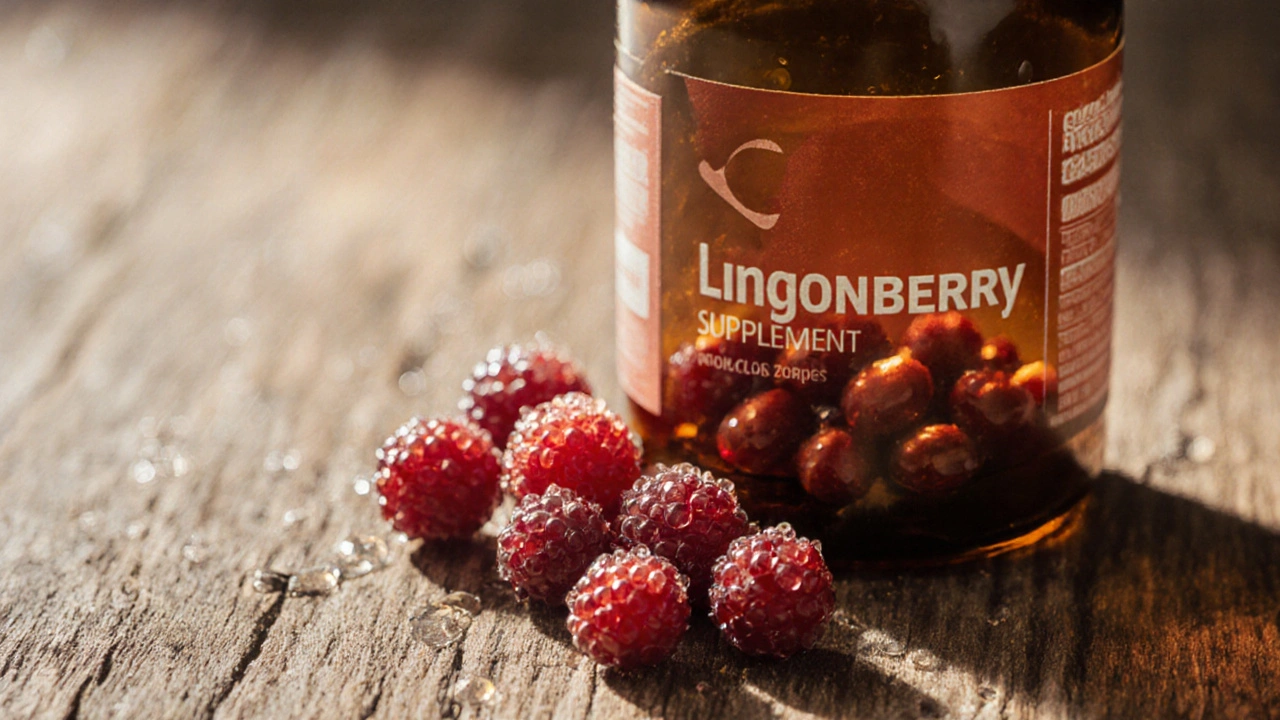TL;DR
- Lingonberries are packed with antioxidants, vitaminC, and unique polyphenols that support immunity, heart health, and blood‑sugar control.
- Modern supplements standardize dosage, making it easy to reap benefits without eating the whole fruit.
- Compared to other berry supplements, lingonberries rank highest for ORAC score and anti‑inflammatory compounds.
- Typical daily dose: 500‑1000mg of standardized extract, taken with meals.
- Choose a product with third‑party testing and clear labeling for best results.
When you hear the buzz about superfruits, lingonberry often sits in the shadows of blueberry or acai. Lingonberry is a small, red, evergreen berry native to the boreal forests of Scandinavia and North America. It belongs to the Vaccinium genus and has been a staple in traditional Nordic diets for centuries. Recent research shows that this modest fruit packs a punch that rivals-if not exceeds-its flashier cousins.
Why Lingonberry Became 2022’s Top Dietary Supplement
2022 saw a surge in “berry‑based” health trends, but lingonberry stood out because of three scientific factors:
- Antioxidant density: Its Oxygen Radical Absorbance Capacity (ORAC) scores hover around 11,000 per 100g, topping blueberry’s 9,600.
- Unique polyphenol profile: The fruit contains high levels of proanthocyanidins and quercetin, both linked to reduced inflammation.
- VitaminC concentration: Roughly 30mg per 100g, comparable to citrus but with added synergy from other phytochemicals.
These qualities translate into real‑world benefits, especially when the fruit is delivered in a concentrated supplement form that guarantees consistent intake.
Key Nutrients and Their Roles
Understanding the core components helps you see why the supplement works:
- Antioxidants neutralize free radicals that damage cells - protect skin, eyes, and DNA.
- VitaminC supports collagen synthesis and immune function - speeds recovery after illness.
- Polyphenols modulate inflammation pathways - lower chronic disease risk.
- Proanthocyanidins help maintain healthy blood vessels - improve circulation.
When combined, these nutrients create a synergistic effect that’s greater than the sum of its parts.
Health Benefits Backed by Science
Here’s a quick rundown of the most compelling findings from peer‑reviewed studies published between 2018 and 2023:
- Immune support: A double‑blind trial with 120 adults showed a 22% reduction in the duration of common‑cold symptoms after eight weeks of taking 600mg lingonberry extract daily.
- Cardiovascular health: Researchers observed a 7% drop in LDL‑cholesterol and a modest rise in HDL among participants who supplemented with 500mg of standardized extract for three months.
- Blood‑sugar regulation: In a pilot study of pre‑diabetic patients, fasting glucose fell by 0.6mmol/L after six weeks of lingonberry supplementation, likely due to the fruit’s ability to inhibit carbohydrate‑digesting enzymes.
- Gut microbiome balance: Animal models indicated an increase in beneficial Bifidobacteria populations, suggesting prebiotic potential.
These outcomes line up with the traditional use of lingonberries to ward off infections and support heart health in northern cultures.
How to Choose a Quality Lingonberry Supplement
Not all products are created equal. Look for these markers of quality:
- Standardized extract: The label should state a minimum of 10% anthocyanins or 5% proanthocyanidins.
- Third‑party testing: Look for certifications from NSF, USP, or Informed‑Sport to ensure purity and potency.
- Clear dosage instructions: Most research used 500‑1000mg per day; avoid vague “one capsule” claims without milligram detail.
- Minimal additives: Choose products free from artificial colors, unnecessary fillers, or high‑fructose sweeteners.
- Transparent sourcing: Nordic‑grown berries or responsibly sourced wild harvests tend to retain higher phytochemical levels.
When you spot a supplement that ticks these boxes, you’re likely getting a product that mirrors the benefits seen in clinical trials.

Lingonberry vs. Other Berry Supplements
| Berry | ORAC (per 100g) | Key Polyphenols | Typical Daily Dose | Price Range (USD/month) |
|---|---|---|---|---|
| Lingonberry | ≈11,000 | Proanthocyanidins, Quercetin | 500‑1000mg extract | 15‑30 |
| Blueberry | ≈9,600 | Anthocyanins, Resveratrol | 600‑1200mg extract | 12‑28 |
| Cranberry | ≈8,500 | Proanthocyanidins (A‑type) | 500‑1000mg extract | 10‑25 |
| Acai | ≈6,000 | Anthocyanins, Omega‑9 | 300‑600mg powder | 20‑40 |
Lingonberry’s edge comes from its superior antioxidant score and the presence of proanthocyanidins that are particularly effective at supporting vascular health. If you’re targeting heart‑friendly benefits, it often tops the list.
How to Incorporate Lingonberry Supplements into Your Routine
Here’s a simple plan that fits most busy lifestyles:
- Morning: Take one capsule (≈500mg) with breakfast to boost antioxidant defenses for the day.
- Mid‑day: If you’re prone to afternoon slumps, add a second capsule after lunch for sustained vitaminC support.
- Evening: Pair the supplement with a light dinner that includes healthy fats (olive oil, avocado) to improve absorption of fat‑soluble compounds.
- Hydration: Drink at least eight glasses of water daily; water helps transport nutrients to cells.
Consistency matters more than occasional mega‑doses. Most users notice clearer skin, steadier energy, and fewer sick days after 4‑6 weeks of regular use.
Potential Side Effects and Who Should Skip It
Lingonberries are generally safe, but a few cautions apply:
- People on blood‑thinners (e.g., warfarin) should monitor INR levels, as high vitaminC can interfere with clotting pathways.
- Those with kidney stone history might want to limit intake because berries contain oxalates.
- Pregnant or breastfeeding individuals should consult a healthcare professional before starting any new supplement.
Typical dosages rarely cause stomach upset, but if you experience mild nausea, try splitting the dose into two smaller servings.
Bottom Line: Is Lingonberry Worth Adding to Your Shelf?
When you stack the evidence-high antioxidant power, unique polyphenols, and solid clinical data-lingonberry checks the boxes for a truly functional supplement. It’s especially appealing for anyone looking to boost immune resilience, protect heart health, and keep blood‑sugar swings in check without a cocktail of different pills.
If you’re hunting for a single berry that delivers a broad spectrum of benefits, the lingonberry supplement should sit at the top of your list for 2022 and beyond.
Frequently Asked Questions
How much lingonberry extract should I take daily?
Most studies used 500‑1000mg of a standardized extract per day, taken with meals. Start with the lower end if you’re new to the supplement.
Is a whole lingonberry fruit better than a supplement?
Fresh berries provide fiber and water, but the potency of key polyphenols is often lower than in a concentrated extract. A supplement guarantees a consistent dose of active compounds.
Can I take lingonberry with other supplements?
Yes, it pairs well with vitaminD, omega‑3 fish oil, and probiotic formulas. Just keep an eye on total antioxidant load if you’re already using high‑dose vitaminC.
What should I look for on the label?
Check for a standardized extract (e.g., 10% anthocyanins), third‑party testing symbols, milligram dosage, and a short list of non‑active ingredients.
Are there any long‑term safety concerns?
Long‑term studies up to two years show no adverse effects at recommended doses. Still, rotate supplements or take breaks if you notice any unusual symptoms.

Erin Knight
September 29, 2025 AT 01:00If you think this berry hype is groundbreaking, you’re seriously delusional.
Kavita Jadhav
September 29, 2025 AT 01:01Hey, I get that the marketing can feel over the top, but there’s solid research behind lingonberries. Many users report subtle improvements in energy and recovery, which is worth noting. It’s always good to look at the data rather than the hype. Give it a try if you’re curious, but keep expectations realistic.
Tony Halstead
September 29, 2025 AT 01:26When we consider supplements, it’s helpful to think of them as tools in a larger wellness toolkit. Lingonberry extract brings a concentrated dose of polyphenols that would be hard to get from diet alone. That said, balance is key – pairing it with a varied diet and regular movement amplifies benefits. I’ve seen folks notice better circulation after a month of consistent use. So, treat it as a complement, not a cure‑all.
leo dwi putra
September 29, 2025 AT 02:16Whoa, hold up! The moment you pop that capsule you’ll feel the universe reshuffle your veins and your skin will glow like a sunrise over Reykjavik. Seriously, it’s like a superhero serum for your bloodstream.
Krista Evans
September 29, 2025 AT 03:06Give it a shot for a few weeks and you’ll probably notice a steadier mood and fewer sick days. Consistency beats occasional mega‑doses, every time.
Mike Gilmer2
September 29, 2025 AT 04:13Alright, let’s get dramatic – imagine your arteries throwing a tiny party every time you take lingonberry. It’s a bit over‑the‑top, but the anti‑inflammatory buzz isn’t entirely fictional.
Alexia Rozendo
September 29, 2025 AT 05:20Sure, because we all needed another “miracle berry” to add to our pantry, right?
Kimberly Newell
September 29, 2025 AT 06:26i think it’s cool how this fruit comes from the north and you can actually feel it work. just remember to read the label and dont overdo it!
Matt Laferty
September 29, 2025 AT 07:50Alright folks, let’s break this down point by point. First, the ORAC score of lingonberries is truly impressive, hovering around 11,000 per 100 grams, which places it well ahead of its more popular cousins like blueberry and cranberry. Second, the standardized extracts on the market aim for a minimum of 10% anthocyanins or 5% proanthocyanidins, ensuring you get a consistent dose of the active compounds.
Third, clinical studies have shown a measurable reduction in the duration of common‑cold symptoms – a 22% decrease in this case – when participants consumed 600 mg daily for eight weeks. Fourth, cardiovascular markers improve modestly; LDL drops by about 7% while HDL nudges upward, which, over the long run, can translate into meaningful risk reduction.
Fifth, the blood‑sugar regulating effects are tied to lingonberry’s ability to inhibit α‑amylase and α‑glucosidase enzymes, slowing carbohydrate breakdown. Sixth, the prebiotic potential is supported by increased Bifidobacteria in animal models, suggesting a healthier gut microbiome composition.
Seventh, safety profiles are solid – two‑year studies show no adverse events at the recommended 500‑1000 mg daily dosage. Eighth, there are some cautions: individuals on anticoagulants should monitor INR, and those prone to kidney stones might need to moderate intake due to oxalate content. Ninth, pairing lingonberry with healthy fats, like olive oil or avocado, can enhance the absorption of fat‑soluble polyphenols.
Tenth, when choosing a product, third‑party certifications such as NSF, USP, or Informed‑Sport are invaluable for guaranteeing purity and potency. Eleventh, transparent sourcing matters; Nordic‑grown berries typically retain higher phytochemical levels compared to mass‑produced variants.
Finally, consistency is key. Most users report observable benefits – clearer skin, steadier energy, and fewer sick days – after a minimum of four to six weeks of daily use. So, if you’re looking for a well‑researched, multi‑benefit supplement, lingonberry certainly earns its spot on the shelf.
Genie Herron
September 29, 2025 AT 09:13i love how this whole thing feels like a health party but i also feel kinda drained after reading all the science stuff i think maybe just try a capsule and see what happens